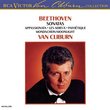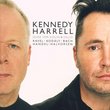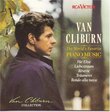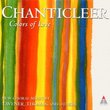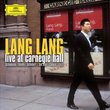| All Artists: Igor Stravinsky, Michael Gielen, SWR Baden-Baden and Freiburg Symphony Orchestra Title: Stravinsky: Symphony in Three Movements; Symphony in C; Symphony of Psalms Members Wishing: 0 Total Copies: 0 Label: Hanssler Classics Original Release Date: 1/1/2006 Re-Release Date: 11/14/2006 Album Type: Import Genre: Classical Styles: Historical Periods, Modern, 20th, & 21st Century, Symphonies Number of Discs: 1 SwapaCD Credits: 1 UPC: 4010276018674 |
Search - Igor Stravinsky, Michael Gielen, SWR Baden-Baden and Freiburg Symphony Orchestra :: Stravinsky: Symphony in Three Movements; Symphony in C; Symphony of Psalms
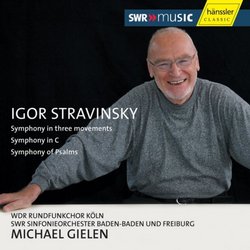 | Igor Stravinsky, Michael Gielen, SWR Baden-Baden and Freiburg Symphony Orchestra Stravinsky: Symphony in Three Movements; Symphony in C; Symphony of Psalms Genre: Classical
The Symphony in Three Movements was composed during the height of WWII (1942-45), and reflects the composer's impressions, mostly gained through cinematic representations, of the ongoing war. The Symphony in C was compo... more » |
Larger Image |
CD DetailsSynopsis
Album Description The Symphony in Three Movements was composed during the height of WWII (1942-45), and reflects the composer's impressions, mostly gained through cinematic representations, of the ongoing war. The Symphony in C was composed during one of the darkest periods in Stravinsky's life--years marked by illness and the death of his mother, his wife, and a daughter. However, in trying to focus on formal concerns in the music, Stravinsky tried to keep his personal feelings out of the symphony. The first two movements were composed in Europe and reflect more of a traditional style. The third and fourth movements were composed after Stravinsky moved to America and herald his growing experiments with rhythmic meter change. The final composition on this CD, Symphony of Psalms, is based on various Psalms from the Bible and consists of three parts. The score's inscription à la gloire de Dieu, "to the glory of God," reveals Stravinsky's purpose for the work. Born in Dresden in 1927 but reared in Argentina, in the 1950s Michael Gielen began to gain a reputation as a conductor of both the Viennese classics and contemporary music, of which he is now an acknowledged master. His mastery of twentieth century idioms is unquestioned. Similarly Requested CDs
|
CD ReviewsGielen's Stravinsky: 3 Symphonies: Rhythmic, Insightful, Tun Dan Fee | Berkeley, CA USA | 12/16/2006 (5 out of 5 stars) "Gee this one is fine. SWR Baden-Baden & Freiburg have built up quite a sterling reputation over the years since their founding, for tackling the gnarliest modern scores and having a good go at music often declared uninteresting or unplayable almost before its ink has dried on its pages. Thanks yet again to Ernest Bour and Hans Rosbaud who laid foundations, strong foundations. Michael Gielen, now a leader of equal interest, has been engaging with the music for a bit more than a decade, between 1986, and 1999. Like Pierre Boulez, Gielen plays Stravinsky as a classic, treasured legacy. He is as interested in the deep openings, structural or harmonic or rhythmic, in Stravinsky's music, not just the surface drama or shock values. The three Stravinsky symphonies on this regular, red book CD are all different neo-classical forays by the past century's master. The music is lean, fleet, muscular, and always evolving in kaleidoscopic explorations with a constant search to discover formal balances as core essentials, refreshed, revealed in the shifting lights of the musical moment. Suddenly the young composer (Russian student of a Russian Rimsky-Korsakov) who caused a real audience riot in Paris with the ballet music for Le Sacre du Printemps is all polyphony, intellect, and poise. Here the composer pays obeisance to the god Apollo instead of the god Pan or the god Dionysius. We can still hear plenty of signature Stravinsky ostinato, but not by pounding the earth till it splits open to erupt with volcanic lava. Instead, the ostinato underpins all the old harmonies, now freshly rehearsed, pitching a new balance between dissonance and consonance while always, dancing, dancing, dancing. Under Gielen and his band, there is not an ounce of extra fat in these works; but you never for a passing moment think of them as too thin, too wispy, or too banal and insubstantial to continue holding your listener's interest. Some passages are light as a feather and just as mysteriously air-born aloft. Whence these breezes you didn't suspect were blowing? Other passages are strong and sure-footed. Padding as completely intent and purposeful as any panther ever stalked it prey in any jungle. All the kill moments in this music, and there are plenty of them, are not the fanged instrumental moments of vicious attack, but rather viewed from a greater and more Socratic distance. The eating and being eaten of primal folklores is artfully revealed as part of the larger scheme of things, ecological. Gielen and band do not wash out the colors or the rhythms. There is as much tonal interplay in these scores as there ever was in Firebird, Petrushka, or Le Sacre. But the point is a further and deeper internalization of what Rimsky-Korsakov taught and exemplified in his approaches to Late Romantic Era orchestration. One is not so much painting vivid pictures, full of folklore and genius. One is mining the allegedly harmonic slag of western concert music, and finding plenty of gold still that melts down into gleaming treasure where more than a whole lot can be made of the vaults Wagner supposedly raided, once and for all, and left empty. What is post-Gotterdammerung? Stravinsky, undoubtedly. The third item on this disc is the fully mature Symphony of Psalms. (1930) As the composer himself intended and realized, now the earlier polyphony comes full circle, and the shifting balances between dissonance and consonance are not so experimental as wise and enduringly gestural. By this time, the composer has found a neo-classical path forward for himself, and he can set the chorus singing Latinized psalms in worship of God as he walks it. These sung psalms are hybrid, as so much of what we consider most modern is hybrid - as the composer himself was hybrid: Russian in heritage, gifted in legal studies and mathematics, and an adult later life convert to Catholicism. Both the Symphony in Three Movements (1945) and the Symphony in C (1940) are farther experimental forays, each distinctive. Gielen catches the fervency as well as the renewed and renewing polyphony of these efforts. In his hands, the players just reach out, and keep reaching, high and wide and low. Listening again, one grows along with the composer, beyond youthful Sturm und Drang - towards peace, towards reflection, towards ineffable openness, all still thinking and feeling. Still evolving. Still dancing - but more with the athletic grace of gymnastics, instead of the bursting leaps and runs of open-aired track and field. Stravinsky is, still, a physical composer above all else. Quite a journey, this disc. Its most immediate competition will perhaps stem from the newly released Robert Craft disc, on Naxos, containing the Symphony of Psalms along with a handful of the briefer, even more experimental and post-neo-classical period works. ( Mass, Cantata, Russian Songs, Babel) That one goes to the keeper shelf, right along with this one. Recommended, but don't leave your thinking cap behind when you listen. Gielen and band are involved in some notable and notably intelligent music-making here. Yes." Precise and controlled, but where's the emotion? Santa Fe Listener | Santa Fe, NM USA | 10/29/2008 (3 out of 5 stars) "I imagine that Stravinsky himself would applaud the way Michael Gielen resists sentiment and emotion in all three symphonies, but must we? Listening to thesse live readings from 2003-2006, I was reminded of this conductor's reputation for mastering the most difficult contemporry works -- he turns x-ray vision on the twiddling counterpoint of the Sym. in Three Movements (reminiscent of the insect film that the composer claims as inspiration), and every rhythmic strand is bright and clear. Even by Stravinsky's dry-Champagne standards, however, these are chilly readings that frequently lose thrust and get lost in details.
I wish Gielen had taken an emotional position instead of dropping this as an irrelevant issue. The Sym. in C seems little different in tone form the Sym. in Three Movements, but if you go back to Stravinsky's setreo accounts wit the Columbia Symphony (sony), one of his best recordings, the contrast between exuberance and bleakness couldn't be more distinct. The blandness of Gielen's Sym. of Psalms is surely wrong-headed. Stravinsky was deeply religious, and even though he found a spare, terse, angular idiom for spiritual feelings, there must be some feeling, right? Gielen's mediocre chorus states the themes, sings the notes, and goes home. In all, a flavorless program that should have been a standout. Perhaps the key to these bleached-out readings is the fact that Gielen turned 80 just after they were completed." |

 Track Listings (10) - Disc #1
Track Listings (10) - Disc #1